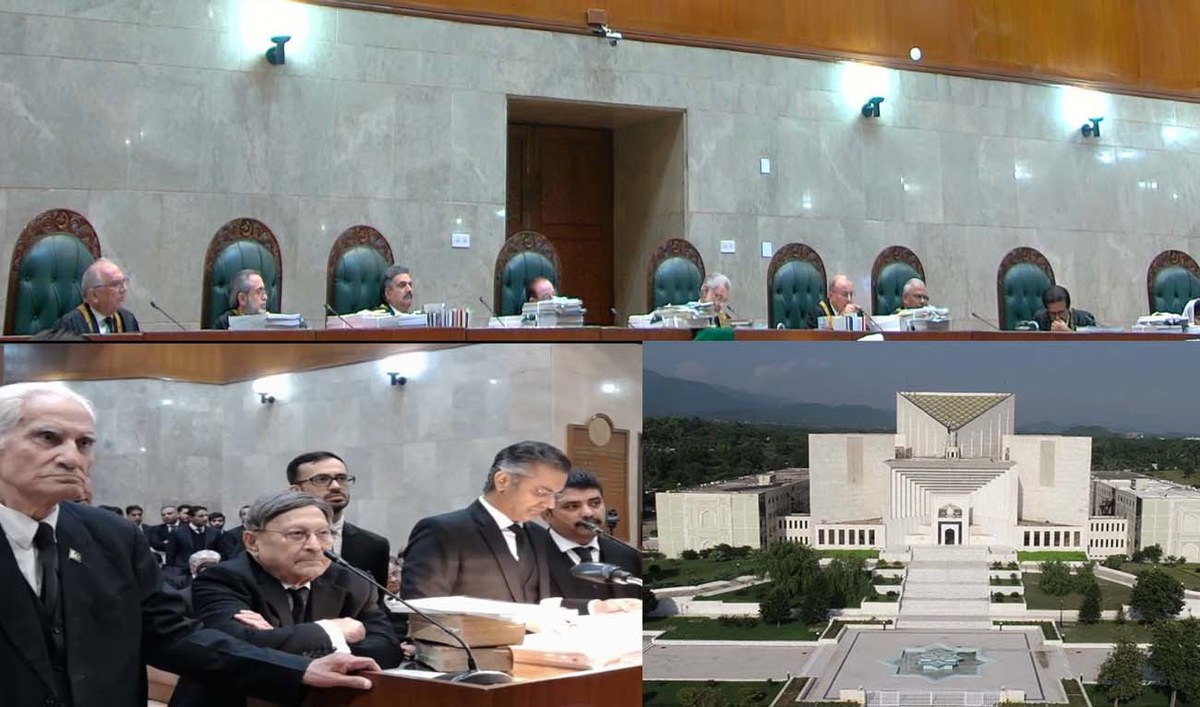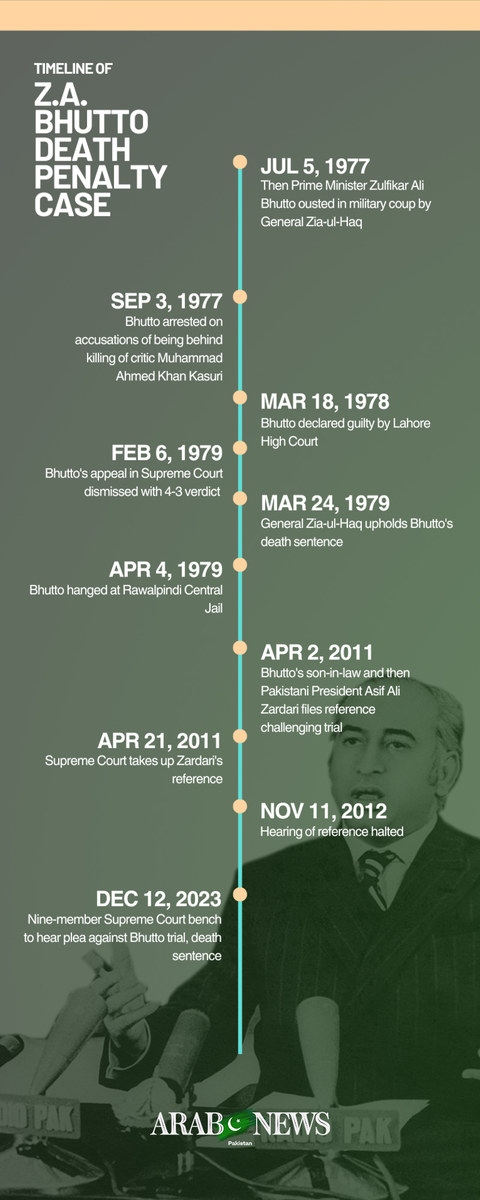ISLAMABAD: Proceedings from Pakistan’s Supreme Court were broadcast live on Tuesday for only the second time in the country’s history, as top judges heard a history-making reference seeking to revisit the murder trial of former Pakistani Prime Minister Zulfikar Ali Bhutto and the death sentence awarded him over four decades ago.
Bhutto, the charismatic and Western-educated founder of the Pakistan Peoples Party (PPP), was hanged on April 4, 1979, at Rawalpindi District Jail after being convicted of conspiring to murder a political opponent. He served as Pakistan’s fourth president from 1971 to 1973 and as the ninth prime minister from 1973 to 1977 before being ousted in a military coup led by General Mohammad Zia-ul-Haq on July 5, 1977, following an election he was accused of rigging.
Bhutto’s hanging is the only instance in Pakistan when a former prime minister was executed and the guilty verdict is still considered one of the most controversial milestones in the nation’s political history. Bhutto’s family and political supporters allege the judges came under pressure from Zia to sentence Bhutto to death. Before his hanging, Bhutto was first declared guilty in 1978 by the Lahore High Court. His appeal in the Supreme Court was then dismissed with a 4-3 verdict.
Former President Asif Ali Zardari, who is Bhutto’s son in law, filed the presidential reference in 2011 when the PPP was in power, citing Article 186 (1 and 2) of the Constitution, which empowers the president to refer a question of public importance to the Supreme Court to seek its opinion or interpretation. Only six hearings were conducted, the last of which took place in November 2012, until the Supreme Court said last week it would begin rehearing the reference from Dec. 12.

The still image taken from a video shows the live proceedings from Pakistan’s Supreme Court in Islamabad, Pakistan, on December 12, 2023. (Photo courtesy: @SCPProceedings/YouTube)
“I must regret on behalf of the Supreme Court that it [case] was not listed earlier because we have a policy now of first in first out unless there is some urgency in a particular case,” Chief Justice Qazi Faez Isa remarked as a nine-member bench heard the case.
Justice Mansoor Ali Shah, a member of the bench, raised questions over the maintainability of the case, saying the Supreme Court had upheld the Lahore High Court’s death sentence and a review petition was also rejected in the case.
“The attorney-general should satisfy us on the maintainability of this reference,” Shah said, saying there was no room for a second review of a judgment under the law. “We cannot touch the judgment that had attained finality.”

The court wad informed that a majority of amici curiae, or impartial advisers, appointed in the past to assist the court in the case had passed away. The court appointed around a dozen new amici curiae to seek their assistance and legal submission in the case.
The court also allowed the legal heirs of Bhutto to appoint their counsels if they wanted to. The case was adjourned until the second week of January, with the court hinting that it might conduct daily hearings once proceedings restarted.
Tuesday’s session was attended by Pakistan Peoples Party chairman Bilawal Bhutto Zardari, who is the late PM’s grandson, former president Zardari and other senior leaders of the PPP party.
After the guilty verdicts by the Lahore and Supreme Courts, the decision to hang Bhutto was made by General Zia despite a flood of petitions for executive clemency from dozens of world leaders, including US President Jimmy Carter, Russia’s Leonid I. Brezhnev, Chinese PM Hua Guofeng and Pope John Paul II, besides thousands of Bhutto’s Pakistani supporters.
Legal experts have for years questioned the trial both in the Lahore High Court and the Supreme Court, and raised questions on the conduct and procedure of the hearings, as well as on the fact that they took place while Pakistan was under military rule. Analysts argue this is the reason Bhutto’s death penalty judgment has never been cited as a precedent in any subsequent case in Pakistan’s judicial history.
Talking to the media after the hearing, Bilawal said he hoped the court would dispense justice after decades of his grandfather’s “judicial murder.”
“The court has decided to restore the nation’s trust in the institution,” he said.
“Let’s hope the honorable judges cast out the shame,” he adding, urging the court to undo the “grievous wrong” of the past.
















